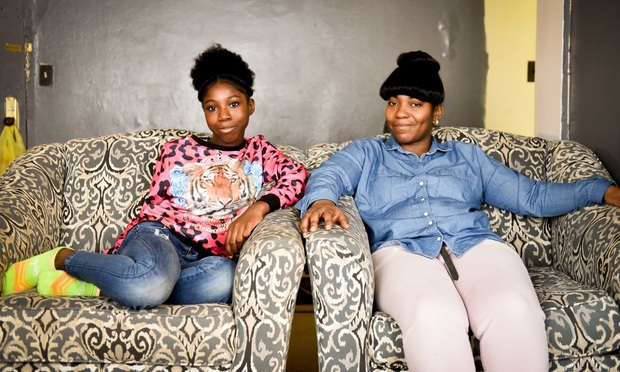 Thomas Giuffra of Rheingold Giuffra Ruffo & Plotkin recently won a $58 million decision against the New York City Housing Authority for his client, 12-year-old Dakota Taylor, pictured left, and her mother, Tiesha Jones, pictured right, of the Bronx. Photo Credit: David Handschuh/ALM
Thomas Giuffra of Rheingold Giuffra Ruffo & Plotkin recently won a $58 million decision against the New York City Housing Authority for his client, 12-year-old Dakota Taylor, pictured left, and her mother, Tiesha Jones, pictured right, of the Bronx. Photo Credit: David Handschuh/ALM
As members of Gov. Andrew Cuomo’s team engage in talks with New York City Council members about improving the city’s public housing stock, the city is also fighting numerous legal battles with public housing residents suing over lead paint.
The New York City Housing Authority was handed a loss in the courts just a few weeks ago when a Bronx jury awarded a $57 million jury verdict to Tiesha Jones, a housing authority resident whose daughter Dakota Taylor was poisoned by lead paint in their apartment, as well as lead paint in Taylor’s babysitter’s apartment.
 Thomas Giuffra
Thomas Giuffra
Attorneys from both sides are now engaged in settlement talks, but the eye-popping verdict came as the housing authority is embroiled in a scandal over lead paint that has led to firings of top NYCHA officials and as a proposed class action filed in the U.S. District Court for the Southern District of New York, on behalf of approximately 400,000 housing authority residents, continues to move forward.
On Thursday, in response to a letter from City Councilman Robert Cornegy of Brooklyn regarding possible state involvement with solving the city’s lead paint crisis, Alphonso David, the counsel to the governor, issued a statement calling the danger posed by lead paint—as well as issues with mold and lack of heat—“a threat to public health and an insult to the residents of public housing.”
David also said that the state has allocated $300 million to the housing authority and has agreed to a request by state Sen. James Sanders, D-Queens, to inspect the NYCHA facilities in his district, but added that he agreed with Cornegy that the problems with NYCHA are systemwide.
He also noted that the state has the power to declare a state of emergency for NYCHA and, on Thursday, council members held a news conference calling on Cuomo to do just that.
“A declaration of emergency can take various forms from expediting contracting mechanisms to intervening with actual task completion,” David said. “That is the discussion we must now have.”
For its part, NYCHA has admitted that it has fallen short on lead paint reporting and complying with regulations, according to a fact sheet on lead paint it issued in November after the city’s Department of Investigation issued a scathing report stating that the housing authority had failed to do required inspections.
“Our compliance to date has been uncoordinated and incomplete—that’s unacceptable,” said NYCHA spokeswoman Jean Weinberg in the NYCHA fact sheet.
The fact sheet also cited a statistic by the city’s Department of Health and Mental Hygiene that lead poisoning in the city is at “historic lows” and that the health department is also inspecting homes for lead paint.
In court battles over lead paint, however, NYCHA and the city’s health department have clashed over inspection findings, such as in Jones’ lawsuit.
The health department inspected Jones’ apartment and found chipped and peeling lead paint in her residence, but the housing authority, which conducted its own inspection, contested the health department’s findings and said lead paint was not present, according to a report from VerdictSearch, a Law Journal affiliate.
Counsel for NYCHA argued that Taylor may one day live to lead a normal life and an expert for the defense said that she may one day go to college.
But the city’s Department of Education reported that Taylor, who is now 12, is intellectually disabled and an expert witness for Jones said Taylor will have limited vocational opportunities.
After a two-week trial, a jury of three women and three men sided with Jones.
“The problem with lead paint cases is that the defense is trying to argue against science,” said Jones’ lawyer, Thomas Giuffra of Rheingold Giuffra Ruffo & Plotkin. “To take the position that lead paint doesn’t cause illness is just like taking science and throwing it out the window.”
Peter Kurshan of Herzfeld & Rubin, who appeared for the NYCHA in the case, did not respond to a request for comment.
In the Meantime, a potentially larger wave of residents are pushing forward with a proposed class action case in the Southern District who are taking the NYCHA to task for “routinely” contesting the health department’s findings from lead paint inspections, as well as alleging that it has “implemented a policy” of not conducting lead testing in apartments constructed before 1978 and in NYCHA common areas and that it has made false statements and filings with regard to lead inspection reports.
Earlier this month, the plaintiffs filed a motion for a preliminary injunction calling on U.S. District Judge William Pauley III of the Southern District of New York to appoint an independent monitor to scour NYCHA’s inspection records and to order NYCHA to inform its residents about the lead paint status of their residences.
The motion is pending and the NYCHA has not filed an answer. The NYCHA did not respond to a request for comment.
Levy Konigsberg attorneys Corey Stern, the lead counsel for plaintiffs filing claims for injuries from the lead-filled water crisis in Flint, Michigan, and Brendan Little are representing the proposed class.
Assistant Corporation Counsel Mark Muschenheim and Max Sarinsky of the city’s Law Department are representing the NYCHA.


